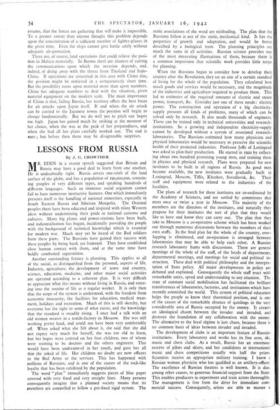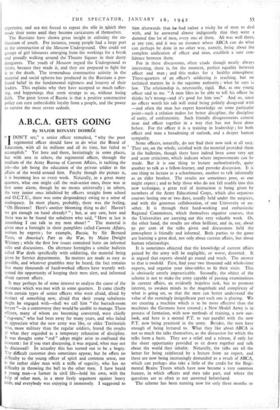LESSONS FROM RUSSIA
By J. G. CROWTHER
MR. EDEN in a recent speech suggested that Britain and Russia may have a good deal to learn from one another. He is undoubtedly right. Russia covers one-sixth of the land surface of the globe, and has a population of 190,000,000, contain- ing peoples of very different types, and speaking hundreds of different languages. Such an immense social organism cannot fail to have numerous instructive features. One which immediately presents itself is the handling of national minorities, especially in South Eastern Russia and Siberian Mongolia. The Oriental peoples there have been educated and inspired with m—any Western ideas without undermining their pride in national customs and cultures. Many big plants and power-stations have been built, and industrialisation has begun, incidentally providing the people with the background of technical knowledge which is essential for modern war. Much may yet be heard of the Red soldiers from these parts. The Russians have gained their success with these peoples by being hard, yet fraternal. They have established close human contact with them, and at the same time have boldly combatted superstition.
Another outstanding feature is planning. This applies to all of the social, as distinguished from the personal, aspects of life. Industry, agriculture, the development of town and country, science, education, medicine, and other major social activities are operated according to a coherent plan. It is very difficult to appreciate vkat this means without living in Russia, and enter- ing into the routine of life as a regular worker. It is only then that the scope of the system is understood, with the freedom from .economic insecurity, the facilities for education, medical treat- ment, holidays and recreation. Much of this is still sketchy, but everyone has the right to some of what exists, and the knowledge that the standard is steadily rising. I once had a talk with an old woman weaver in a textile-factory in Moscow. She was still working pretty hard, and could not have been very comfortably off. When asked what she felt about it, she said that she did not expect very much for herself, she was too old to learn, but her hopes were centred on her four children, two of whom were training to be doctors and the others engineers. This would have been undreamt-of in her youth, and gave her all that she asked of life. Her children no doubt are now officers in the Red Army or the services. This has happened with millions of Russians, and is one of the causes of the rock-like loyalty that has been exhibited by the population. The word " plan " immediately suggests pieces of blue paper covered with very fixed and very straight lines. Many persons consequently imagine that a planned society means that its members are compelled to follow a pre-fixed rigid system. The static associations of the word are misleading. The plan that the Russians follow is not of the static, mechanical kind. It has the properties of growth and adaptation, and would be better described by a biological term. The planning principles are much the same in all activities. Russian science provides one of the most interesting illustrations of them, because there is a common impression that scientific work provides little scope for planning.
When the Russians began to consider how to develop their country after the Revolution, they set an aim of a certain standard of living for the whole of the population. They calculated how much goods and services would be necessary, and the magnitude of the industries and agriculture required to produce them. This led to estimates of the required amounts of electric and steam power, transport, &c. Consider just one of these needs : electric power. The construction and operation of a big electricity- supply presents all kinds of problems, many of which can be solved only by research. It also needs thousands of engineers. These can be trained only in technical universities and research- institutions. So a growing and independent electricity-supply cannot be developed without a system of associated research- laboratories. The Russians estimated how many physicists and physical laboratories would be necessary to preserve the scientific health of their projected industries. Professor Joffe of Leningrad was asked to plan their production. He started in 1920 by collect- ing about two hundred promising young men, and training them in physics and physical research. Plans were prepared for new institutes to be built in all regions of Russia. As good men became available, the new institutes were gradually built in Leningrad, Moscow, Tiflis, Kharkov, Sverdlovsk, &c. Their staff and equipment were related to the industries of the localities.
The plans of research for these institutes are co-ordinated by the Academy of Sciences, and are settled by committees that meet once or twice a year in Moscow. The majority of the members are the directors of the institutes, and naturally they propose for their institutes the sort of plan that they would like to have and know they can carry out. The plan that they take to Moscow is a co-operative scheme which has been worked out through numerous discussions between the members of their own staffs. In the final plan for the whole of the country, over- lapping is eliminated, and co-operation is arranged between laboratories that may be able to help each other. A Russian research laboratory hums with discussions. There are general meetings of the whole of the staff, of the heads of departments, departmental meetings, and meetings for social and political in- struction. These deal with political philosophy and the interpre- tation of State policy. All major developments in policy are debated and explained. Consequently the whole staff react with remarkable unity, speed and understanding to any situation. The state of constant social mobilisation has facilitated the brilliant transferences of laboratories, factories, and institutions which have recently astonished the world. This system of political education helps the people to know their theoretical position, and is one of the causes of the remarkable absence of quislings in the very considerable area of Russia occupied by the enemy. It creates an ideological chasm between the invader and invaded, and destroys the foundation of any collaboration with the enemy. The alternative to the loyal regime is just chaos, because there is no common basis of ideas between invader and invaded.
The development of clubs is an important feature of Russian institutions. Every laboratory and works has its free aero, ski, music and chess clubs. As a result, Russia has an enormous reserve of pilots and skiers, and her candidates at international music and chess competitions usually win half the prizes. Scientists receive an appropriate military training. I know a Russian woman physicist who has qualified as an artillery-officer. The excellence of Russian theatres is well known. It is due, among other causes, to generous financial support from the State. This enables producers to experiment and train actors thoroughly. The management is free from the drive for immediate com- mercial success. Consequently, artists are able to master a
repertoire, and are not forced to .repeat the role in_w,Isich they made their name until they become caricatures of themselves.
The Russians have shown great insight in enlisting the en- thusiasm of youth. For instance, young people had a large part in the construction of the Moscow Underground. One could see groups of girl labourers emerging from the workings for a break and proudly walking around the Theatre Square in their dusty dungarees. The youth of Moscow regard the Underground as theirs, because they made it, and they are prepared to fight for it to the death. The tremendous constructive activity in the material and social spheres has produced in the Russians a pro- found belief in the fundamental rightness and honesty of their leaders. This explains why they have accepted so much suffer- ing, and happenings that seem strange to us, without losing faith. The great lesson of Russia is that a positive constructive policy can earn unbreakable loyalty from a people, and the power to survive the most severe ordeals.



























 Previous page
Previous page